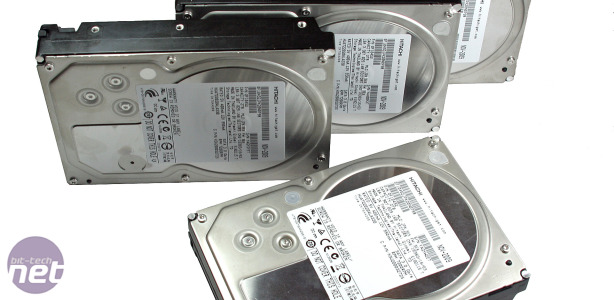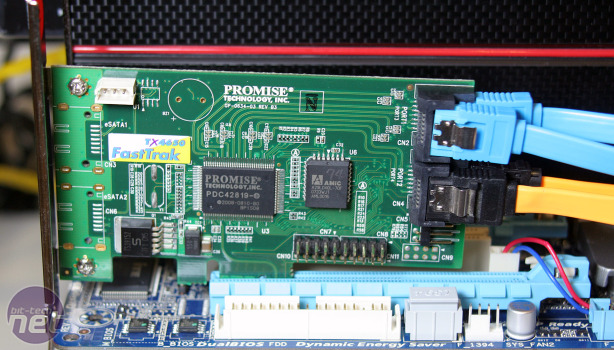Results Analysis
On sheer throughput performance the Intel Rapid Storage technology of the ICH10R Southbridge of our motherboard typically offered much more performance than the Fastrak TX4650. In AS SSD we saw the on-board RAID controller deliver speeds 2-5 times faster than the Promise except in the sequential read test for the RAID 5 setup. Even if you were to use the Promise card for a RAID 5 array to benefit from the 105.8MB/sec write speed rather than the 47.5MB/sec of the Intel controller, you’d suffer poxy 148.1MB/sec read speed rather than the excellent 332.1MB/sec of the Intel chip.To double-check these poor sequential read and write speeds, we ran the ATTO Disk Benchmark application too. The sequential write speed tests of ATTO showed some potential for the Promise card, with faster write speeds than the Intel controller when controlling a RAID 5 setup and using data of larger blocks than 4KB. When using 64KB blocks of data we saw a speed of 134.1MB/sec rather than 47.1MB/sec, for example. However, performance in RAID 0 mode was worse than that of the Intel controller which consistently delivered over 420MB/sec rather than the 55-205MB/sec of the Promise card.
Switching to the sequential read speed of the Promise card in ATTO was again comparably poor. In every test, no matter what file size we used, the Promise gave a fraction of the speed of the Intel controller. We saw a terrible 1.9MB/sec speed when dealing with 4KB files, rather than the 100.6MB/sec of the Intel chip; the other tests revealed speeds that were merely 2-3 times slower. The real-world example of that crushing 1.9MB/sec read speed was demonstrated as we waited an excruciatingly long time for Iometer to create the 16GB test file full of 4KB chunks. It took so disproportionately long that we thought the system had crashed.
Iometer revealed some interesting characteristics of the Promise card – the 4KB files of the test meant that Promise card was slower at handling random data than the Intel controller, though not by the huge margins we saw in the sequential speeds tests. The Promise’s random read speed of 0.6MB/sec in RAID 5 mode wasn’t much slower than the 0.9MB/sec of the Intel controller while the Intel controller was only 15 per cent fastest in the random read test.
While the maximum latency of the Promise card was much lower than that of the Intel controller whether it was dealing with write or read commands, the Intel controller had a much lower average latency than the Promise card. This indicates that the Intel controller might stutter occasionally but typically operates with less latency than the Promise typically suffers from.
We tried copying some very large multi-gigabyte files from a single Samsung SpinPoint F1 drive to the RAID 5 array on the FastTrak TX4650 to see how it fairs in a more real-world test. This is indicative of how the card will cope when copying your own personal DVD rips to a central storage box, for example. The caching of Windows 7 took over at first and yielded an impressive 100+MB/sec but this quickly dropped to a much lazier 40MB/sec. AS the SpinPoint F1 can deliver 80-100MB/sec of sequential data, and that a single Hitachi Ultrastar hard disk can accept at least much data per second, the Promise card is clearly a bottleneck.
Conclusion
If you're looking to use the Promise Fastrak TX4650for a high-performance storage array, don't because it's not up to the job. In almost every situation the Promise card was 2-5 times slower than the on-board Intel ICH10R RAID controller of our motherboard. We suspect the card is limited by the 1x PCI-E 1.1 connector, as a 250MB/s connection (with CPU overhead further slowing things down) looks far too skinny. Even with our disks organised in RAID 0 didn't offer much more speed than when they were configured in a RAID 5 layout, which has to deal with the extra redundancy calculations.The other big limitation of the Promise card is the fact the chunk sizes cannot be changed in its BIOS. Everything is set to 16KB and the cursor simply flicks over this option. Compare that to Intel's onboard RAID in the ICH10R Southbridge, and it offers anything between 4KB and 128KB for RAID 0, 10 or 5. Couple that with the fact Intel's most recent Rapid Storage software now also offers online RAID migration and expansion, and it leaves very little reason to buy the Promise Fastrak TX4650 for £100 when your motherboard likely has a superior RAID controller for free.
In fact, for £100, why not just buy a new motherboard? Any decent Intel P55, H57 or X58 or even a P45 motherboard has superior RAID technology to this card. While the Promise card was stable throughout testing, and was easy to use, the same can be said of our motherboard’s RAID controller. All of which means that the Promise TX4650 is a pointless purchase if you already have a halfway decent motherboard with a built-in RAID controller.
- Performance
- x
- x
- x
- x
- -
- -
- -
- -
- -
- -
- 4/10
- Features
- x
- x
- x
- x
- x
- x
- x
- -
- -
- -
- 7/10
- Value
- x
- x
- -
- -
- -
- -
- -
- -
- -
- -
- 2/10
- Overall
- x
- x
- x
- x
- -
- -
- -
- -
- -
- -
- 4/10

MSI MPG Velox 100R Chassis Review
October 14 2021 | 15:04











Want to comment? Please log in.